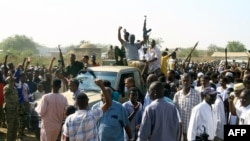For almost a year, Sudan has been gripped by fighting between the regular army, which is backed by the government and state security apparatus, and the paramilitary Rapid Support Forces.
One drone "struck state security and intelligence headquarters, but did not cause significant damage," a security source told AFP from Gedaref, more than 400 kilometers (250 miles) east of the capital Khartoum.
Witnesses in Gedaref reported "loud anti-aircraft fire" from the army.
In Al-Faw, 150 kilometers to the west, a military source said "a drone had bombed" an army division.
Both officials requested anonymity as they were not authorized to speak to the media.
Al-Faw is only 25 kilometers east of the front line between the army and the paramilitaries.
Eastern Sudan had until now been considered a safe haven for millions of civilians displaced from Khartoum and other battlegrounds.
According to the latest figures from the United Nations, nearly half a million people are sheltering in Gedaref state alone.
North of Gedaref on the Red Sea, the city of Port Sudan has become a makeshift headquarters for government ministries loyal to the army command. The port city has also become the base for United Nations relief efforts.
Nearly all aid coming into Sudan — where famine has all but taken hold and disease outbreaks are on the increase — flows through the east.
In Al-Jazira state, Sudan's pre-war breadbasket where witnesses have reported increased clashes, the army has "made progress" towards state capital Wad Madani, a military source said early Tuesday.
The RSF has had nearly uncontested control of the state since December, when the army withdrew in the face of advancing paramilitaries.
In the vast western region of Darfur, also nearly entirely controlled by the RSF, witnesses reported army air strikes on three state capitals — Nyala, Al-Daein and El Fasher.
Both sides have been accused of war crimes, including the indiscriminate shelling of residential areas.
A UN expert report released last year determined that the army in Darfur was "not only unable to protect civilians but also used aerial bombing and heavy shelling in urban areas," often resulting "in the heaviest losses of civilian life."
Since last April, the fighting has killed many thousands — including up to 15,000 in one Darfur town — and displaced 8.6 million people.










Forum